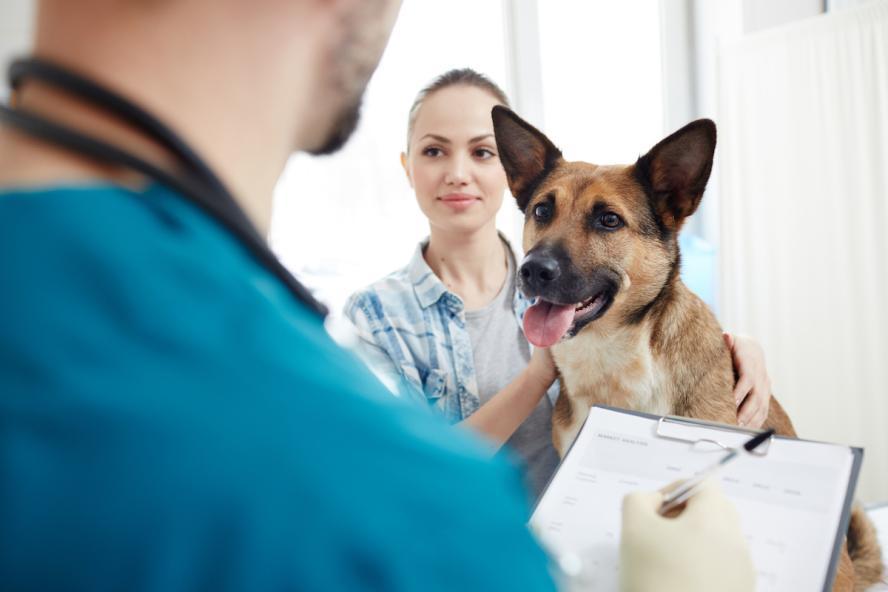-
About
- Leadership & Faculty
- News & Events
-
Academics
- Graduate
- Advanced Clinical Training
- Continuing Education
- Academic Departments
- Academic Offices
- Simulation Experiences
-
Student Life
- Offices
-
Research
-
Hospitals & Clinics
- Emergency Care
- Hospital Services
-
Community Outreach
- Volunteer
Do I Need Pet Insurance?
Ask the Expert

The growth of the pet insurance industry has doubled over the past four years, according to the State of the Industry Report released by the North American Pet Health Insurance Association in May 2022. Premiums totaled a record $2.83 billion in 2021, with more than 4.41 million insured pets across North America. Here are some things to know when considering pet insurance.
What is pet insurance and what does it typically cover?
Pet insurance is a health insurance plan for pets and is designed to offset the medical costs related to mostly illnesses and accidents, although some also cover wellness. Typically, the policies cover items other than pre-existing conditions. For example, if the pet was seen for allergies before the owner signed up, then any further visit related to allergies would not be covered.
In practice, owners pay the veterinary hospital then submit the invoices and medical record to the insurance company for reimbursement. However, there are some hospitals that establish connections with insurance companies and can receive payments directly from the insurance company. Most cover 90% of the bill. Specific coverage varies by company. Some have breed-specific exceptions of coverage because some medical issues are related to those breed characteristics.
Why should I get pet insurance?
Insurance can be a great benefit for owners, especially those that do not have significant financial means. There are certain breeds that tend to develop certain chronic conditions (bulldogs and allergies for example). Other breeds have a higher risk of certain conditions. Labradors have a higher risk of knee issues that require surgery (which costs about $5,000–8,000) to fix per leg and when one leg is affected, the other leg usually develops it as well.
Is pet insurance available for pets other than dogs and cats?
Yes, an online search will yield companies that offer policies to exotics such as ferrets, rabbits, reptiles, and birds.
What should I look for when purchasing pet insurance?
Take advantage of online resources comparing pet insurances. Carriers with 24/7 pre approvals are particularly useful, especially when a pet has an emergency. For example, a pet needs surgery and the treatment plan is $10,000. Most veterinary hospitals will need a deposit for these services. With an insurance carrier with preapprovals, it will approve the treatment plan and instead of putting down a deposit, the insurance pre-approval waives the cost of a deposit.
Other things to consider include no payout caps, deductible fees, and the percentage of coverage for veterinary care.
Some employers offer pet insurance as a benefit to their employees. Make sure to read this carefully to confirm what is covered, and what is not.
At Cummings School of Veterinary Medicine at Tufts University, uninsured clients are offered Care Credit, a credit card used at most veterinary hospitals and dental offices which offers financing options of 6–60 months.
Conclusion
Pet insurance can save thousands of dollars if your pet gets sick. It can be especially helpful for pet owners without disposable income or those with breeds that commonly have chronic or costly issues. For others, it's a personal choice to consider. Like any insurance, you pay it with the hope that you won't need it. Overall, purchasing pet insurance is highly recommended.
Client Relations Veterinarian Dr. Brian Moore and Assistant Accountant Supervisor Joanna Marra serve Cummings School’s Henry and Lois Foster Hospital for Small Animals. Moore has practiced for 15 years, seeing dogs, cats, and exotic species. Marra is the proud owner of dog Fiona and cats Louie and Grant.
Department:
Foster Hospital for Small Animals